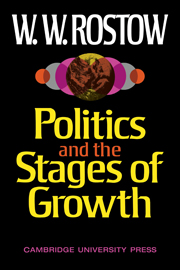Book contents
- Frontmatter
- Contents
- Tables
- PREFACE
- INTRODUCTION
- 1 A way of looking at politics
- 2 Politics in pre-Newtonian societies
- 3 The politics of the preconditions for take-off
- 4 The politics of the take-off and the drive to technological maturity
- 5 American politics: a not so special case
- 6 The politics of the search for quality
- 7 Politics and democracy in the contemporary developing world
- 8 War and peace in the global community
- APPENDIX: The views of others in relation to the approach taken here
- NOTES
- INDEX
- Frontmatter
- Contents
- Tables
- PREFACE
- INTRODUCTION
- 1 A way of looking at politics
- 2 Politics in pre-Newtonian societies
- 3 The politics of the preconditions for take-off
- 4 The politics of the take-off and the drive to technological maturity
- 5 American politics: a not so special case
- 6 The politics of the search for quality
- 7 Politics and democracy in the contemporary developing world
- 8 War and peace in the global community
- APPENDIX: The views of others in relation to the approach taken here
- NOTES
- INDEX
Summary
In the largest sense, politics helps determine the quality of the environment in which men live their lives. As Bernard Crick has said: ‘Politics can not make men good, but they can make it easier or harder for us to be good.’
In the contemporary world this proposition has a particular meaning. On every continent, in almost every nation, men are caught up with unprecedented rates of change in their domestic lives. This is as true for rich countries as for poor; countries ruled by communist as well as non-communist governments, be they democratic or autocratic. And rapid change is hard for the political process to handle with grace.
It is equally true that the international environment is changing fast and changing in a particular way. The world is in transition from Cold War to something else.
It still contains ample explosive raw materials for chaos and even greater violence than we see every day in Southeast Asia and the Middle East. But it also contains the raw materials for substantial movement towards world order in the next generation. And whatever a man can do to tip that balance in the right direction, he ought to do.
This book contains quite a lot of historical analysis; and for this I do not apologize.
There is a kind of schizophrenia in the endless aphorisms about the usefulness – and lack of usefulness – of history to man.
- Type
- Chapter
- Information
- Politics and the Stages of Growth , pp. 1 - 6Publisher: Cambridge University PressPrint publication year: 1971



